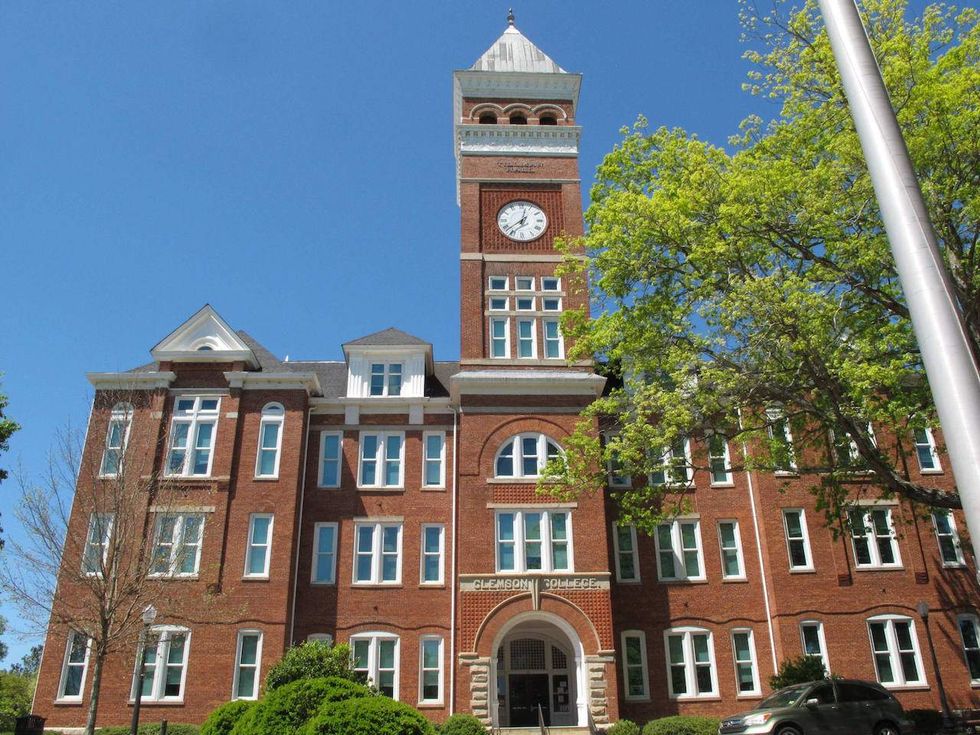
Tillman Hall on the campus of Clemson University (AP Photo/Jeffrey Collins)

A group of Clemson University professors are fasting in an effort to pressure the public college's administration into opposing President Donald Trump's executive order that temporarily bars refugees and immigrants from seven Muslim-majority countries.
The "Fast Against Silence," as it is called, began Monday in order to "call attention to the refusal of the university administration to call for an end to" to the executive order, Dr. Chenjerai Kumanyika, an assistant professor in Clemson's communication department, said in a Facebook post about the protest. The fast will last until Sunday.
The fast is also in solidarity with refugees, such as those from Syria, who "will be forced to go hungry because they will not be accepted as refugees into the United States," Kumanyika said.
Dr. Todd May, a longtime philosophy professor, and Dr. Michael Sears, an associate professor in the biological sciences department, have also joined in the protest in front of Clemson's Sikes Hall.
May told Inside Higher Ed that 14 other Clemson professors and students had committed to joining the protest with shorter fasts as of Monday morning. And while May is on sabbatical, Kumanyika and Sears will leave the protest spot to teach their classes.
One of the reasons Clemson should join with other universities that oppose the ban is to "join their voices with the voices of other universities and their weight," May told Inside Higher Ed, adding that Clemson football's recent national championship win could elevate the university's impact.
"A second thing is for the sake of students here at Clemson," he said. "I've talked with a lot of Muslim students here. A lot of them are feeling afraid, isolated and not supported by the university administration because they won't issue a public statement."
May pointed out that Clemson — along with about 600 other universities — has signed onto an American Council on Education letter that asks Homeland Security Secretary John Kelly to work to implement policies that would keep the U.S. safe while still allowing for international exchange among students in higher education.
The letter says in part:
We are confident that our nation can craft policies that secure us from those who wish to harm us, while welcoming those who seek to study, conduct research and scholarship, and contribute their knowledge and talents to our country. We look forward to building on our partnership with the Department to address these important issues.
Clemson President Jim Clements told the Greenville News that the university board declines to comment on political issues.
"There’s always going to be an issue that comes out, and another one next week and another one next week," Clements said.
In a statement to TheBlaze, Clemson Vice President for University Relations Mark Land said:
Universities are places where a variety of ideas are vital to critical thought, the advancement of knowledge and the education of our students. Additionally, as a state institution Clemson complies with the free speech requirements of the U.S. Constitution. As such, Clemson University respects the rights of its employees and students to voice their personal views in an appropriate manner.
As the Independent Mail reported, there are approximately 115 students at Clemson who are from the countries where a ban is in place.
"Many people I know are affected or work with people who are affected," Sears told Inside Higher Ed. "For science in our country to remain strong, we need to have a diverse work force. I’m here in support of that and also to be a role model for our students in the sciences who often don’t see their professors taking political action."
Meanwhile, nearby Wofford College President Nayef Samhat called on Trump to cancel his executive order earlier this month.
"Wofford College stands in solidarity with other colleges and universities across the country that are supporting the Association of American Universities request that 'the administration’s new order barring the entry or return of individuals from certain countries … end as quickly as possible,'" Samhat wrote in a message to the private college's community.
Dr. David Woodard, Clemson's Thurmond professor of political science, told TheBlaze the fasting professors have a "long history of political activism here on campus but not much for scholarship and teaching."
Woodard predicted that the administration would "support," not "admonish," those protesting.
"Clemson has turned the administration building into a venue for causes — race last spring, immigration this fall and who knows what will happen in the spring as we go on," Woodard said.
"The end result of this atmosphere is a diminished emphasis on learning and an increase in the 'activism' which counts for class projects and meaning here on campus," he continued. "Some students tell me that 'all I do in professor X's class is agree with him, and get an A.' It seems to be a common complaint here."
Neither Kumanyika nor May, the two original fasting professors, responded to a request for comment from TheBlaze by time of publication.